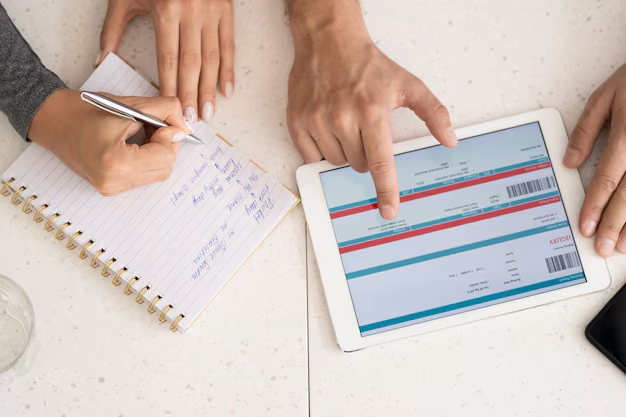Your Guide to How Long Does It Take For Irs To Cash Check
What You Get:
Free Guide
Free, helpful information about IRS FAQ and related How Long Does It Take For Irs To Cash Check topics.
Helpful Information
Get clear and easy-to-understand details about How Long Does It Take For Irs To Cash Check topics and resources.
Personalized Offers
Answer a few optional questions to receive offers or information related to IRS FAQ. The survey is optional and not required to access your free guide.
How Long Does the IRS Take to Cash Checks in 2024?
For many taxpayers in the United States, understanding the timeline for when the IRS will cash a check can be crucial to effective financial planning. Whether you're sending in a payment for your taxes or paying a balance due, knowing when the check will be processed can help you manage your finances with confidence.
🕒 IRS Processing Time for Checks
When you send a check to the IRS, you might wonder how long it will take for them to process it. Generally, the IRS can take anywhere from a few days to a few weeks to cash a check. However, the time can vary based on several factors, including mailing delays, the IRS's workload during tax season, and the specific operation location handling your payment.
Influencing Factors
- Tax Season Volume: The most significant factor affecting processing times is the IRS's volume of work during tax season, which typically peaks in April.
- Mailing Location: The origin of the check and the destination IRS center can also affect processing time.
- Payment Method: While checks are traditional, electronic methods are faster, and paying online through the IRS's website is usually processed more quickly than a mailed check.
📄 Steps to Ensure Faster Processing
To ensure your check payment is processed promptly, follow these practical steps:
- Mail Early: Try to send your check well before the deadline to ensure it arrives on time.
- Complete Details: Ensure that the check is filled out completely and correctly, including the correct payable to section: "United States Treasury."
- Include Necessary Documentation: Attach any required forms or paperwork that specify what the payment is for, such as a payment voucher.
- Use Accurate Address: Double-check the IRS mailing address specific to your region and tax form. Sending to the wrong address can lead to longer processing times.
✔️ Alternatives to Mailing Checks
With technological advancements, more convenient options than mailing a check can expedite your IRS payment. Here’s a look at some alternatives:
- Direct Pay: The IRS offers Direct Pay, a secure service allowing you to pay your taxes directly online using your bank account.
- Electronic Funds Withdrawal (EFW): This option allows you to make a payment when filing your return electronically. It can be scheduled to suit your timeframe.
- Credit or Debit Card: You can pay your tax obligations using a credit or debit card through IRS-approved payment processors, albeit with processing fees.
- Electronic Federal Tax Payment System (EFTPS): A free service provided by the U.S. Department of Treasury, EFTPS allows individuals and businesses to securely pay their taxes online.
📅 What if the IRS Hasn’t Cashed Your Check?
If you've sent a check to the IRS and noticed it hasn't been cashed even after a considerable time, here are steps you can take:
- Track Via Delivery Confirmation: Always send IRS mail with delivery confirmation to track its arrival.
- Check IRS Status: Utilize the IRS online portals to check payment status if available for your tax form.
- Contact the IRS: Reach out to the IRS directly if your check remains unprocessed for a prolonged period. It may help them locate and process your payment faster.
💡 Key Takeaways
Here’s a quick summary to help streamline your IRS check payments:
- 📅 Submit Early: Avoid processing delays by mailing your check well before the deadline.
- ✅ Verify Details: Ensure names, addresses, and documentation are complete and correct.
- 🌐 Consider Alternatives: Use electronic payment options for faster processing.
- 📞 Stay Informed: Use IRS tools and direct communication to track payments and resolve issues.
Wrap-Up Insight
Managing your tax payments effectively requires awareness of processing times and alternatives to traditional methods. While paper checks have been the standard method for decades, electronic options now offer faster, more secure, and more efficient ways to settle your tax obligations. By following best practices in submission and checking your payment status, you can avoid unnecessary finance charges or complications with your tax records. Always consider the individual circumstances of your tax liability and plan accordingly to maintain a stress-free financial pathway.
What You Get:
Free IRS FAQ Guide
Free, helpful information about How Long Does It Take For Irs To Cash Check and related resources.

Helpful Information
Get clear, easy-to-understand details about How Long Does It Take For Irs To Cash Check topics.

Optional Personalized Offers
Answer a few optional questions to see offers or information related to IRS FAQ. Participation is not required to get your free guide.


Discover More
- Are Irs Economic
- Are Irs Economic Impact Payments Still Available
- Are We Getting Ctc Payments In 2024 Irs
- Can Form 8822 Be Faxed To Irs
- Can I Brown Act Irs
- Can I Call The Irs
- Can I Edit Any Irs Payment After I Did It
- Can I Go To Irs For Support
- Can I Have The Irs Apply My Overpayment If Divorced
- Can I Make Payments To The Irs
